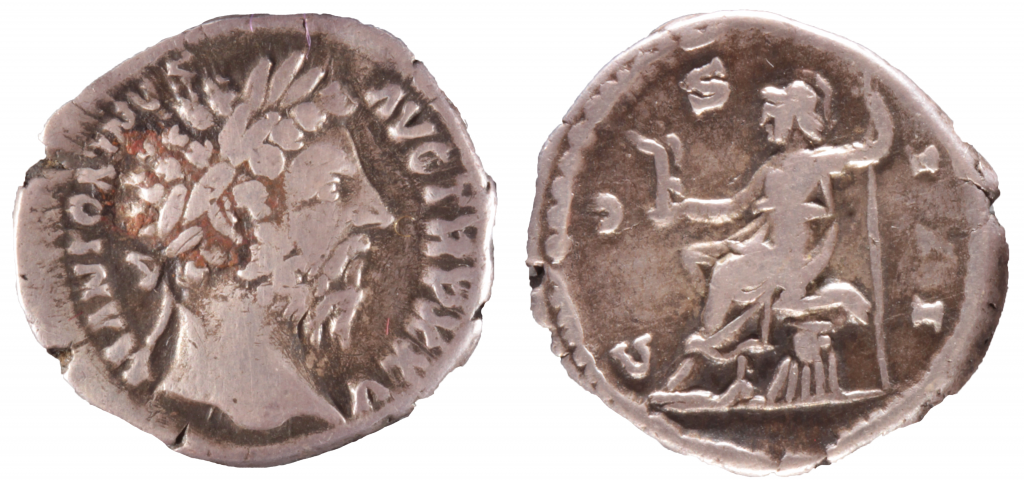April 26, 2015, by Will Leveritt
On this day in AD 121, the emperor Marcus Aurelius was born
Text by Mike Welbourn
Image by Kelly Grimshaw
He was born in Rome and named Marcus Annius Verus, son to a relatively inconspicuous father of the same name who died as praetor-designate in 124, when Marcus was only three years old.

AR denarius of Marcus Aurelius. Obverse has laureate head of emperor right, M ANTONINVS AVG TR P XXV. Reverse has Roma seated, holding spear and Victoria on outstretched hand, COS III. 3.49g, 19mm, 12 o’clock.
By contrast, his paternal grandfather (another Marcus Annius Verus) was a very distinguished senator who had achieved the extremely rare distinction of being chosen consul three times (97, 121, and 126). When his father died, it was this grandfather who adopted Marcus and raised him. Marcus’ mother, Domitia Lucilla, was also from a wealthy senatorial family.
It seems that the emperor Hadrian took an interest in Marcus from a young age, such that in 136, at the age of fourteen, he was given the honour of the post of prefect of the city during the Latin festival.
A still more significant sign of favour was that in the same year, Hadrian arranged for Marcus to be betrothed to Ceonia Fabia, the daughter of Lucius Commodus, who Hadrian intended to succeed him as emperor (until his untimely death in 138). This suggests that Hadrian wished the young man to become attached to the ruling dynasty.
Indeed, when Hadrian eventually settled upon Antoninus Pius as his successor, he obliged him to adopt Marcus as his son (as well as Lucius Commodus, the young son of Hadrian’s first choice for successor). It remains unclear which of the two boys Hadrian wished ultimately to ascend to the throne, but Pius’ intentions are much clearer: he favoured Marcus.
So when Hadrian died in July 138, Pius ended Marcus’ betrothal to Ceonia Fabia and arranged for him to marry his own daughter, Faustina the Younger. That Pius intended Marcus to succeed him is made still clearer by the fact that Lucius was kept very much in the background during his reign, while Marcus was given offices and honours, and generally pushed to the forefront of public life.
Pius died in March, 161. At this point Marcus made a bold move: whatever Pius’ views may have been, Marcus seems to have understood that Hadrian had wanted Lucius to come to the throne. So he arranged for his adoptive brother Lucius to be made co-emperor with himself. For the first time in history, the Roman Empire had two Augusti, though it probably was understood from the beginning that ultimate authority lay with Marcus.
When war with the Parthians broke out in 162 Marcus sent Lucius to conduct the ultimately successful campaign in the east. Then, another war, this time along the northern borders of the Empire erupted in 167. The next year both emperors began to move north, spending the winter of 168/9 at Aquileia with the intention of beginning an offensive in the spring.
But the plague which Lucius’ triumphant troops had brought back from the East was playing havoc with the legions, and the famous doctor, Galen, who was Marcus’ physician advocated a return to Rome (as did Lucius, who had never been keen on the new military campaign). On the return journey Lucius died suddenly, perhaps of a stroke, at the age of 39.
The barbarian threat in the north did not subside, but Marcus had now to deal with it as sole emperor and after a brief sojourn in Rome to attend to the funeral of his brother, he was back in the north by the autumn of 169.
The emperor would, indeed, spend the majority of what was left of his reign fighting the northern tribes. His final break from this responsibility was caused by a rebellion in the east in 175: one of his most capable military commanders, Avidius Cassius – whom Marcus had left in charge of essentially the whole eastern portion of the empire while he fought the Germanic tribes – was misled by rumour into believing the emperor had died, and he made a play for the throne.
When it became clear that Marcus was still very much alive, Cassius was murdered by the troops. The emperor felt obliged to restore order by touring the east with his son, Commodus, who had been summoned to his side. At the end of this tour, the emperor chose to return to Rome for what would be the final time; he was back in the city by the autumn of 176. On 1 January the following year, he made his fifteen year-old son consul and co-emperor. After a gap of eight years, the empire once more had two rulers.
In the late summer of 178, the two rulers went north once more. Marcus seems to have planned to quell the troublesome tribes by converting certain of their territories into new provinces of the empire, and the campaigns in the period 178-9 went well for him.
Unfortunately, his plans were never realized. In early 180, Marcus fell ill, perhaps with plague, and died aged 58, on 17 March. Commodus had little interest in carrying on the war. He made peace with the barbarians and returned to Rome and its pleasures soon after his father’s death.
No comments yet, fill out a comment to be the first

Leave a Reply